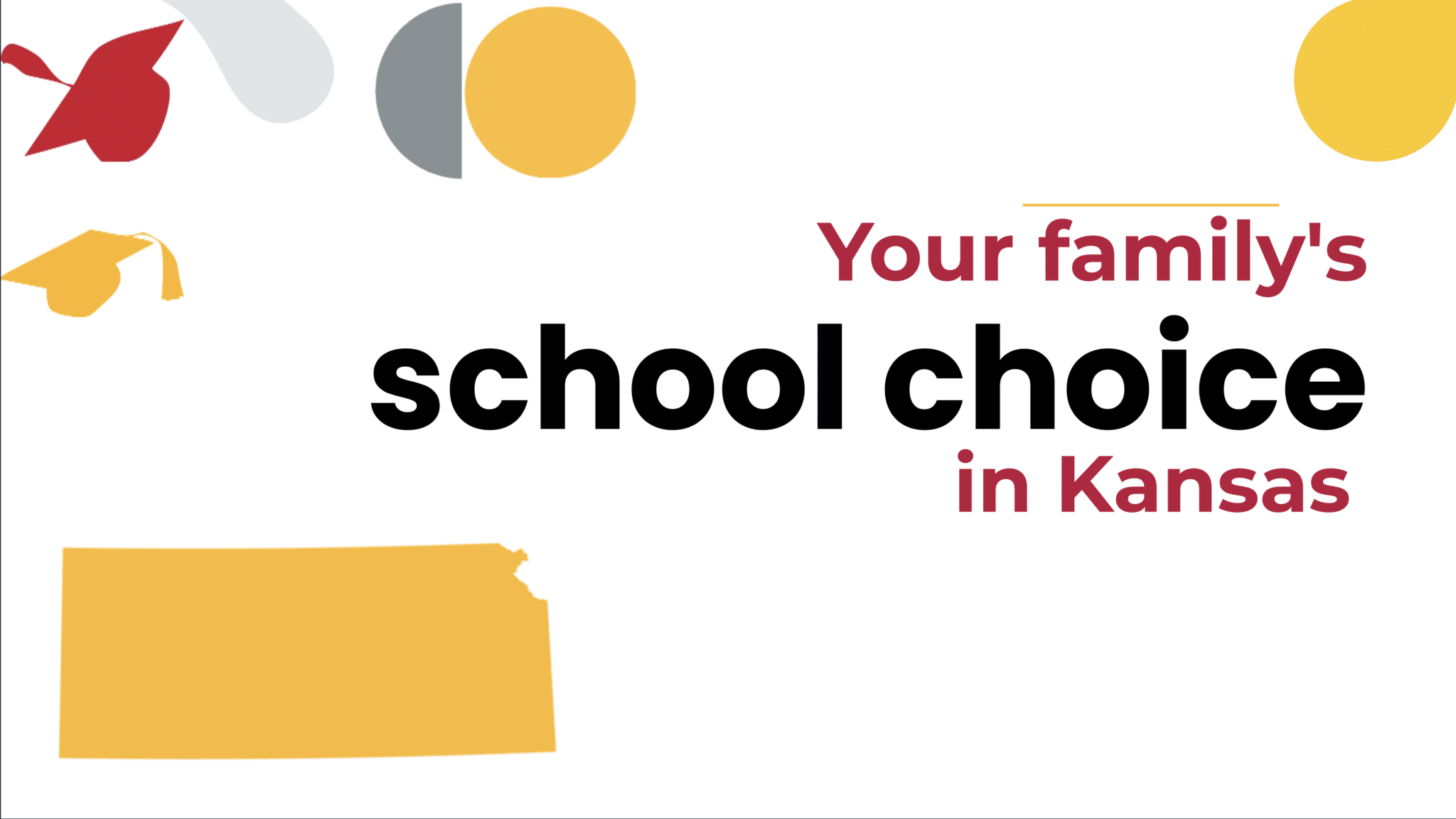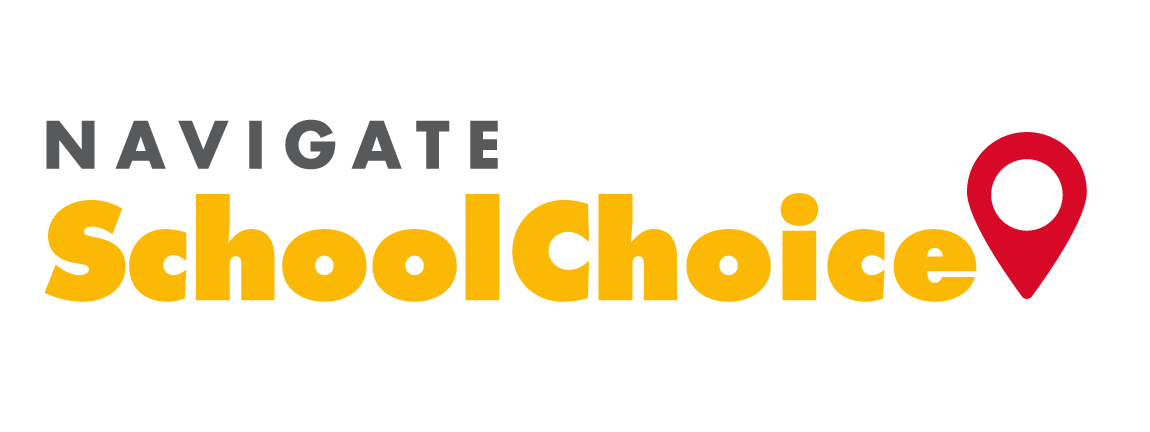Choosing a school? You’ve got options.
Kansas parents, like parents everywhere, want to be able to choose a school where their child will learn and thrive. Finding the best school fit starts with knowing your options. There are a variety of school environments (seven in total!) available for students in the Sunflower State.
Families in Kansas can choose from traditional public schools, public charter schools, public magnet schools, private schools, online learning, and homeschooling. We’ll also talk about microschooling and mix-and-match learning.
Looking for special education options? You can learn what special education services are available in Kansas at the Ultimate Guide to Special Education.

- Traditional Public Schools
- Public Charter Schools
- Public Magnet Schools
- Private Schools
- Online Schools
- Homeschool
- Microschooling
Kansas Traditional Public Schools
Most children in Kansas (87.8% of all K-12 students) attend traditional public schools. Traditional public schools are free to attend, open to all students, operated by school districts, and funded by taxpayers like you. Did you know that Kansas spends an average of $13,449 per public school student each year? You can search your school’s spending and that of nearby schools at Project Nickel.
Some school districts in Kansas may allow open enrollment. Open enrollment refers to whether you can send your child to a public school other than the one assigned to you. Since districts set their own open enrollment polices in Kansas, parents should check with their local school district for more information. For a real-world example, check out Shawnee Mission School District’s transfer policies. When a student participates in open enrollment, the two school districts must work out a transportation plan to share costs amongst themselves.
A bill passed in 2022 allows students to transfer to any public school district with the room to take them. If open enrollment is an option for you, take advantage of it by visiting multiple public schools near you and discovering which is the best fit for your family. Traditional public schools aren’t all the same: They may differ in learning methods and one may just “feel different” than another to you.
Find out more about public schools in your state at the Kansas State Department of Education. Learn more about open enrollment at “Public Schools Without Boundaries: A 50 State Ranking.”
Kansas Charter Schools
Depending on where you live in Kansas, you may also be able to choose a public charter school. Kansas charter school legislation passed in 1994. Today, the state has 9 public charter schools serving 0.6% of all K-12 students.
Charter schools are tuition-free public schools that operate within a district but have extra freedom and independence to innovate. Public charter schools are accountable to their authorizer (which could be a college or school board) for student achievement. Because charter schools are public, there is generally no special requirement for admission… anyone can attend! If there are more families seeking admittance to a charter school than there are seats, an old-fashioned lottery system is usually used to determine admittance.
Free transportation is available to some students who attend charter schools in Kansas and live within the district where the charter school is located. Students with special needs who have an Individualized Education Program (IEP), students who live 2.5 or more miles away from their school, and students receiving free and reduced lunch are eligible to receive transportation assistance.
Kansas Magnet Schools
Magnet schools are a third type of free public school. In Kansas, about 3.1% of all K-12 students attend a public magnet school. Magnet schools allow kids to focus on specific themes, like science or the performing arts. As Wichita Public Schools describes, “Magnet schools are based on the premise that all students do not learn in the same ways, so if there is a unifying theme or a different organizational structure for students of similar interest, those students will learn more in all areas.”
In the Wichita district, there are 17 elementary magnet school locations and eight middle, high, and K-8 magnet locations. The deadline for applying to Wichita magnet schools is typically late January for middle and high schools, and early February for elementary schools.
There are also other magnet schools throughout the state, such as in Hutchinson, Kansas City, and Topeka. For example, Scott Dual Language Magnet Elementary School in Topeka offers instruction in both English and Spanish.
These might be a good option if your child learns best by focusing in on a subject he or she is passionate about.
Kansas Private Schools
Families in Kansas can also consider private schools, nonpublic schools that charge tuition. Private schools may offer a unique curriculum, smaller class sizes, or a faith-based tradition. Kansas’s more than 230 private schools come in all shapes and forms, from religious schools to schools designed for children with special needs.
Tuition for private schools in the state can vary widely, but it averages $6,978 for elementary schools and $10,462 for high schools. Kansas’ first private school choice program was launched in 2015 and provides scholarships for low-income families to access another education option. In 2023, eligibility for the scholarship was expanded. Now, students from families earning up to 250% of the federal poverty level — about $75,000 a year for a family of four — can apply. Currently, 0.3% of all K-12 students participate in this program.
There may also be other private scholarship opportunities available; for example, ACE Scholarships works to provide scholarships for low-income children in Kansas.
Learn more at Private School Review: Kansas.
Kansas Online Learning
If you’re considering online learning in Kansas, you’re in good company. More than 14,000 Kansas students used a part-time or full-time online option in 2021. Kansas offers many free, full-time online learning options for students across districts. These include Andover eAcademy, Manhattan Virtual Academy, Haven Virtual Academy, USD 309 Central State Academy, E-School Virtual Charter Academy, Maize Virtual Preparatory School, Kansas Connections Academy, the Lawrence Virtual School (the largest online school in the state), and Kansas Online Learning Program.
There are many other options, some of which serve specific grades or regions. For example, for students in grades 7-12, an online option is the Insight School of Kansas, which specializes in helping students overcome obstacles to academic success. The Kansas State Department of Education keeps a comprehensive directory of virtual school programs, which includes many single-district online schools too. You can search the list for programs near you or programs that allow out-of-district student transfers.
To read more about online learning in Kansas, check out the Digital Learning Collaborative’s state profile.
Kansas Homeschooling
Homeschooling is another school option in Kansas and all 50 states. As technology and school choices have spread in Kansas, homeschoolers have more support and resources than ever.
In Kansas, 0.6% of all K-12 students are homeschooled. You must register as a non-accredited private school before starting to homeschool. It is also recommended that you formally withdraw from your public school so your student is not marked truant. In the case that you decide to return to public school, the school will test students for appropriate placement and decide what credits to accept.
You are not required to teach specific subjects or use specific standardized tests if you choose to homeschool in Kansas. Plus, a bill passed in 2023 makes it easier for homeschool students to participate in Kansas State High School Association activities, like sports and band.
Check out the Home School Legal Defense Association’s resources about Kansas homeschooling, the process of parents educating students at home. You may also want to check out the Midwest Parent Educators or Christian Home Educators Confederation of Kansas.
Kansas Microschools and Mix-and-Match Learning
Today, many Kansas families are mixing and matching school choices to come up with new ways to personalize education. Microschools are one of these ways. A microschool refers to students gathering together in a small group – with adult supervision – to learn, explore, and socialize. Microschools can take a variety of shapes and legal forms, from homeschoolers coming together at an enrichment center to a private school committed to small classrooms. What microschools share in common is a commitment to small-group learning and close-knit relationships, along with an emphasis on children as individual learners.
Kansas is a happening place for microschooling! Here are just a few real examples of microschools and related resources in your state:
Green Gate Children’s School in Wichita is one example of a microschool with a private school format.
Wichita Innovative Schools and Educators is a community group that supports families and educators who are seeking alternative education models for children. You can find a directory on their site of more than 20 alternative schools and educational co-ops.
Hear the story of one parent who started a Prenda-affiliated learning pod in Wichita on the LiberatED podcast.
Urban Preparatory Academy in Wichita provides alternative educational opportunities for children from low-income and working-class families. Most students use the state’s low-income tax-credit scholarship program to attend the small private school.
The Izora Elaine Dean Education Center is a tutoring center turned microschool.
Wildflower Community School is a small independent school specializing in serving neurodivergent learners in Wichita.
Arise Microschool is an intentionally small community-based microschool in Topeka, Kansas.
ReWild is a microschool community in Hutchinson that seeks to restore and protect the natural rhymes of families and create more diverse, harmonious, and sustainable homes.
Some cities in Kansas, such as Shawnee, have developed city code to regulate remote learning support programs. You can always check with your local governance about whether they are developing regulations applicable to your learning pod.
Remember, microschooling is more a mentality than a specific legal distinction in most cases. Often, a family participates in a microschool while legally homeschooling, or being enrolled in a private or online school.
[nscw_school_finder]
Microschooling and Mix-and-Match Learning
How can it empower parents and help kids achieve their dreams?
7 Step Guide
Tips to help you find a school where your daughter or son will learn, succeed, and be happy.
Education Resources for
Kansas Parents
For additional information about school choices in
Kansas, visit these resources:
Every state is different when it comes to school choice options.
Sign up below to get a detailed comparison:
"*" indicates required fields

